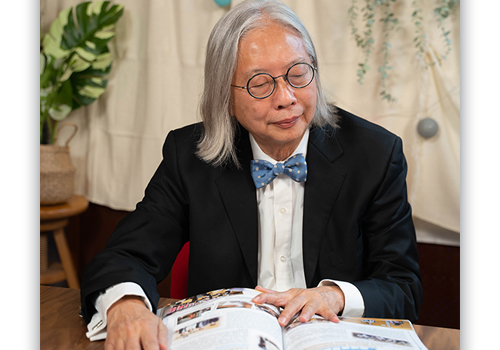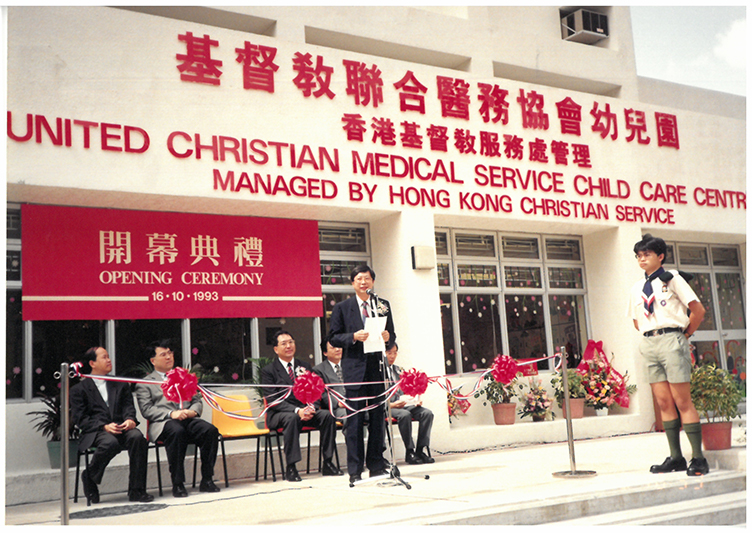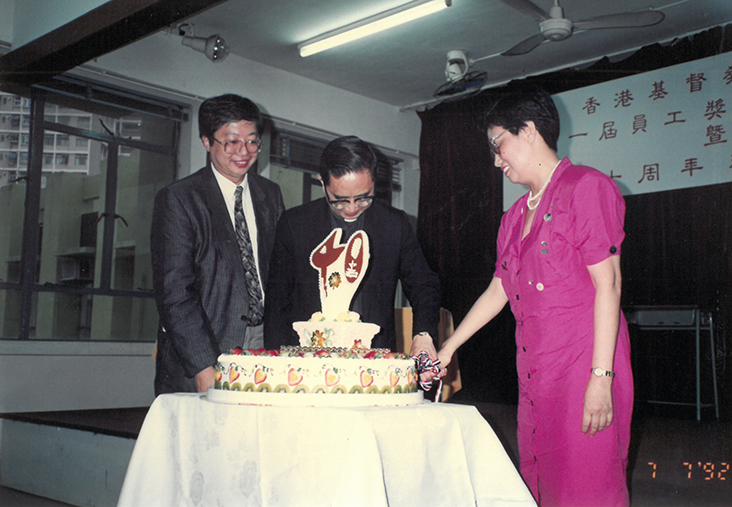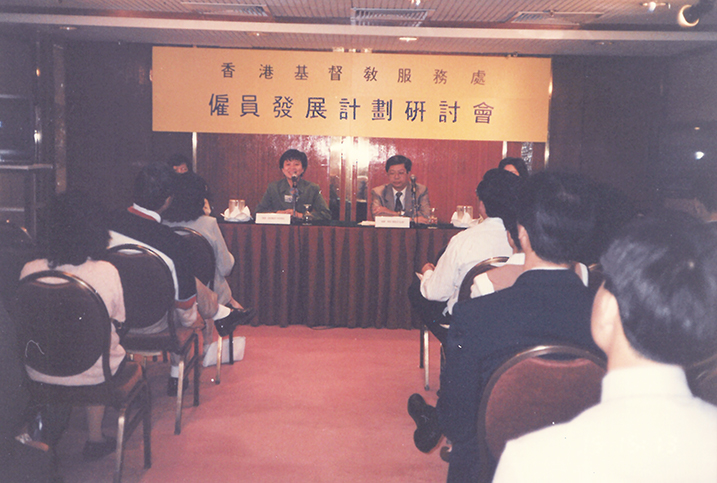The feature of HKCS: Ideas come first
"I only had one job in my life, and I only wrote a cover letter once", Mr Ng Shui Lai (hereinafter referred to as Mr Ng), BBS, MBE, JP said with a smile that his first and last job was to serve HKCS. Mr Ng's strands of silver hair are filled with wisdom and tied into a small tail. He always dresses in light clothes. His words are full of humour. Looking back on his half-life work, he was still familiar with it like his ancestral treasure.
In 1969, Mr Ng joined the agency. The Chinese name of HKCS was changed in 1976. He explained the reason why there was a name-changing decision, "That was because the main function of HKCS had changed. In the past, we mostly coordinated work and linked up different churches or institutions to provide services. Later in time, we merged with the Lutheran World Service, Hong Kong, which enhanced the provision of direct services. HKCS was then renamed in Chinese, but the English name remains unchanged as the Hong Kong Christian Service throughout the years".

Mr Ng Shui Lai, BBS, MBE, JP Former Chief Executive (1988-2011)
An influx of relief supplies, short of hands
When asked the origin of HKCS, Mr Ng said bluntly, "This issue is quite complicated and cannot be explained in a few words". HKCS was originally formed by the conglomeration of several Christian organisations in a gradual timeline. In 1952, the Hong Kong Christian Welfare and Relief Council, and several organisations were established at about the same time.
The Hong Kong Christian Welfare and Relief Association was a local organisation. It was established mainly because of the influx of relief items sent from European and American countries to Hong Kong since the 1950s. The organisation assisted in receiving the supplies such as clothes, canned food and milk. It helped arrange transportation, storage, and then the distribution and processing. The Association then played a coordinating role and was assigned with the warehouse to store the inventories by the government. Mr Ng described that along with the continuous development in society, the association also extended to different services, such as vocational training for women.
Foreign voluntary organisations: Hong Kong people shall take led of the services
At the same time, the Hong Kong Church World Service originated from the United States was established to provide social services to Hong Kong people locally after the war. "More than a decade later, the Hong Kong Church World Service believed that Hong Kong's social services should be handed over to the locals. Therefore in 1967, the Hong Kong Church World Service merged with the Hong Kong Christian Welfare and Relief Council and became the Hong Kong Christian Service. It then turned into an auxiliary agency of the Hong Kong Christian Council."
Then came the Lutheran World Federation Department of World Service from Germany. It was one of the few organisations at the time that had provided professional social services as they employed trained social workers. "In addition to relief works, they also provided services for the elderly, vocational training, youth services, and rehabilitation services and more", said Mr Ng. After more than a decade of relief work, they believed that Hong Kong was out of the list of beneficiaries and were considering evacuating Hong Kong. In 1976, the Lutheran World Service, Hong Kong merged with HKCS.

The common ideal: social service is not a missionary tool
There was a variety of Christian denominations or organisations providing social services in Hong Kong in the 1970s. Why did the World Lutheran Church choose to merge and collaborate with HKCS? "The main reason was that the two organisations had the same ideal around the provision of social services." Mr Ng explained that many churches provided social services and regarded them as missionary tools, and their ultimate goal was to spread the gospel. "Whilst the World Lutheran Church and HKCS upheld a novel perspective and believed that the social services were conducted in the name of the faith in Christ". It is precisely because of this common belief that the two organisations just fell into the same place seamlessly.
During the interview, Mr Ng emphasised repeatedly, "The prominent specialty of this agency is not what types of services we provide, but why we provide these services and what is the philosophy behind". He believes that HKCS’s social services reflect the Christian faith, respond to the social needs and play a pioneering role. "That's why we put forward the idea of 'Social Service Laboratory' in the 1980s". "To be a pioneer is to take the lead and present a role model. By acknowledging the social service gaps in the society, we must try to fill them and introduce the appropriate services accordingly. We have to respond to the most urgent needs of society", Mr Ng added.
 Mr Ng hosted at the 40th Anniversary ceremony of HKCS
Mr Ng hosted at the 40th Anniversary ceremony of HKCS
 In 1992, Mr Ng attended a seminar on employee development plans of HKCS.
In 1992, Mr Ng attended a seminar on employee development plans of HKCS.
"To be a pioneer is to take the lead and present a role model."
The innovative services play an exemplary role
Although the uniqueness of the agency is not solely determined by the services it provides, HKCS has indeed carried out many innovative services and some of which have played an exemplary role. Mr Ng said, "The first thing I have to mention is the Wah Hong Hostel established in the 1960s. There are two main features. The first one is that it is not a care home for the elderly that is detached from people but in the heart of a public housing estate. The elderly would take care of themselves there, such as doing the cooking. Secondly, it embodies the spirit of church cooperation. Churches and different institutions can secure a place by offering a reservation fee and refer the elderly in need." Wah Hong Hostel can be regarded as unprecedented, and its service has been recognised by the government. We also opened another hostel for elderly in Kwai Fong a few years later.
Another significant branch of work is the social work service we provides at schools. "Back then, schools had to pay for services! Fortunately, the government then introduced the policies where it started to assign a social worker per school." Mr Ng recalled that HKCS was very "forward-thinking" and had already provided primary schools social services in the early 1970s. The Government only allocated funds for social work services in primary schools until more than 20 years later. In addition, the foster care service implemented in the early 1970s, the “Infant Stimulation and Parent Effectiveness Training Project" launched in the early 1980s, and the "Employee Assistance Programme" in the early 1990s were all pioneered by our agency. "We have definitely taken the lead. If we can really help those in need, then the government or other agencies will collaborate and help more people with appropriate services". He put emphasis on it again, "We are motivated by the social needs witnessed in the society".
After leaving HKCS for a decade's time, Mr Ng cannot forget the recollection weaved by his co-workers and service users. He recalled one of the most memorable moments — "I remember a time when I went to Japan for a meeting. While waiting in the hotel lobby, a tall young man came over and shouted 'Mr Ng'. I was startled and thought: this Japanese young man is incredible with his Cantonese. Afterwards, I found out that he was a graduate of Kwun Tong Vocational Training Centre (KTVTC), and after graduation he went to work in Japan." He recalled with a hint of smile, "I was not only happy because I met Hong Kong people in a foreign country, but I was also even more pleased knowing that he had achieved a lot in his career and that our services really helped him".
Mr Ng said that although many services have been completed, the impacts of services on the beneficiaries are lifelong. "The most important thing is not what we do, but to understand why we do it", in which it marks the hallmark of our services.
"We have definitely taken the lead.
If we can really help those in need,
then the government or other agencies will collaborate and
help more people with appropriate services"








